-
Posts
6,887 -
Joined
-
Last visited
-
Days Won
6
Posts posted by Notes_Norton
-
-
On 4/19/2019 at 11:31 AM, craigb said:
I wonder if you could play the Hokey Pokey as 12 bar blues... I mean, you should be able to handle the turn-around, ya? ?
What if the Hokey Pokey is really what it is all about???
-
21 hours ago, Grem said:
We did it for years. Great song, I always enjoyed playing it.
It's a fun 12 bar blues, I like up-tempo shuffles, and the way we do it I get to play 2 sax solos, 24 bars each.
Playing 12 bar blues is like comfort food to me. I wouldn't want to do it all night, but every now and then it's just fun.
Insights and incites by Notes
-
 1
1
-
-
We do that tune at gigs, it goes over well with the over 40 year old audiences.
Insights and incites by Notes
-
 1
1
-
-
Flip Flop and Fly?
-
I'm not a dinosaur by desire. I accept whatever works for me.
I started using backing tracks in 1985 (I created them myself with a 4 track real to real Teac), when digital with the Atari/ST and primitive synths as soon as they were introduced, started writing aftermarket style and song disks for Band-in-a-Box in 1992 (and still do), went wind synth when the Yamaha WX7 was introduced, and tried a few soft-synths. I even have a Morph Sensel alternative controller on order.
I've ordered a few software synths and tried a few of my friends' but as of yet, haven't found anything that works for me onstage. Perhaps someday. Technology marches on.
Insights and incites by Notes
-
The PM soft synths (thanks for the links) don't approach what the VL does. There are different degrees of PM. The VL has models of single reeds, double reeds, cupped mouthpieces, plucked strings, bowed strings etc., plus models of the various pipes (conical or straight) boxes and other resonators, and finally various dampers like bells, bridges, and so on. In addition it has models of throat growl, flutter tongue, lip slur, and various other physical things that the players do to influence the instrument. If you model only one of these things, you can say PM.
Here is a clip of a synth sax I did in 2004. It was recorded live, on a gig, with a pre-iPod Archos GMini Juke Box recorder and a cheap mic. Low fidelity, hung out in the crowd, so don't expect the tone to be great. It's the sax expressiveness that seems natural. All the instruments are synthesized with various early 20th century sound modules. I used a Yamaha WX5 Wind MIDI controller and a Yamaha VL70m synth for the sax solo.
http://www.nortonmusic.com/mp3/_sunshinesax.mp3
I had some fellow wind synthesizer players bring their soft synths over on Mac and PC computers. We like to share what we have because we are a small community and visit each other whenever we are close enough. Nothing I tried feels as much like playing a real instrument (as opposed to controlling a synth) as the VL does.
The VL unfortunately after 15 years went out of production. I have two now. The main drawback is it is monophonic, so with two I can layer sounds.
And yes, when I hardware lasts forever, that was a figure of speech. Software synths tend to last until the next OS upgrade or two. I always use either a UPS or a line conditioner to feed current to my synths. It might be why they last so long. The only thing I had to repair so far was a floppy disk drive hardware sampler from Peavey. It still works.
If I were recording in a studio, I'd probably try to mix soft synths with the hardware modules. After all, there are some soft synths that aren't available in a hardware package. But I've been a live performer since I was a kid, and while I'm amazed at what the folks on the other side of the glass do with their computers, sliders and knobs, whenever I've been in the studio, I've been in the microphone side of the fish tank.
Insights and incites by Notes
-
 2
2
-
-
Yes my TX81z and my VL70m might be 'doing the math' just as the VST does, but because the VST shares the computer's CPU, certain shortcuts are taken in the soft-synth to save processing time. So in the end it just doesn't sound the same.
I've never found tuned percussion on a software synth that sounds and reacts like my TX81z and my DS8
I did try sampling, but with the FM synths, the attack, sustain, brightness with different attack velocities isn't duplicated with the sampler, resulting in less expressiveness.
And nobody has made a physical modeling software synth, so the now discontinued VL70m is the only option. My VL can do things like add flutter tongue and throat growl to a brass instrument. It can change the vowel sound on sax patches as if I were changing the shape of my mouth to get slightly more oo and aah sounds. When the pitch-bend (reed emulation) on the sax is flexed, not only does the pitch change, but the tone changes as well, as it does on a real sax. I can do lip slurs on the brass patches. The timbre of the instruments change gradually with pitch realistically including the shift when woodwinds go from register to register. There are so many other nuances that PM can replicate. It's like playing a real instrument instead of controlling a synth.
To me, recreating the nuances of the instrument bring out the nature of the instrument much more than the tone.
But like I said, there is more than one correct way to make music.
It's looking so far like I'm the only dinosaur here ;)
Insights and incites by Notes
-
First of all, there is more than one right way to make music, and my way might not be best for anyone else. But I'm curious.
Does anyone else prefer hardware MIDI modules to software synths?
It seems like it's getting more and more difficult to find good hardware synth modules. Yet there are plenty of soft-synths available.
The way I see it is this:
- Hardware MIDI synths last forever. I have a Yamaha TX81z, a Korg DS-8 and a Roland MT-32 that were manufactured when PCs still used DOS-5 or maybe Windows 3.1, Atari/ST computers had built in MIDI ports, and Mac computers used Motorola CPUs. Some of the sounds on these modules are stale, but others are stellar and have no contemporary equal. Plus how many software synths from that era still work today? Zero. How many software synths have been orphaned when computer OS systems evolved? Plenty
- Hardware synths store all their sounds in ROM. Software synths must 'do the math' creating every note, every nuance, and every articulation while the sequence is playing. This taxes the computer's CPU which is also running the DAW and perhaps other background jobs
- Since all the sounds in hardware synths are stored in ROM, the latency is negligible and they all run about 5ms plus or minus 1ms. I've seen some software synths that have a latency of almost a half second.
- Since there is no tax on the CPU and since all the hardware synths have the same latency I can mix sounds from my rack of 10 or more synths. I can pick the best snare drum for the song from one module, the best kick drum from another, the best bass from another the best guitar from another the best trumpet from another the best sax section from another and do on. They will all be in sync.
- With practically zero latency I can add track after track in real time while the old ones are playing and have the new track in sync.
- With zero load on the CPU for sounds, the hardware synths can be better sounding or better responding. I have yet to see any software synth that can do what the physical modeling Yamaha VL70m can do -- and it's been discontinued for years. The nuances it can reproduce are light years ahead of any sample or sample-modeling synth.
Through the years I have added new synth modules while my ancient stone-age sound modules still contribute to my mixes.
To be fair, there are also advantages to software synths.
With all the talk about software plug-ins, sometimes I feel like a dinosaur. Are there any other dinosaurs out there?
Notes
-
 2
2
-
-
On 3/26/2019 at 10:08 AM, craigb said:
Bought it in 1960!!! I'm impressed you're still even interested in sax at your age!
Yes but I use softer reeds (ha-ha-ha)
Seriously, I've made my living doing music and nothing but music for most of my life. I am of retirement age, but have no plans to do so. Playing music is not what I do, it's what I am. Besides, gigging is the most fun I can have with my clothes on.
My first paying gig was when I was in junior high school, at a school dance. This is when I discovered some girls are attracted to musicians. So you get on stage, have fun playing music, pretty girls 'make eyes' at you, and at the end of the night someone gives you money. That's living the dream.
Insights and incites by Notes
-
Save the candy for Halloween and do the local dentist a favor ;)
-
Coltrane was one of the greatest sax players of the 20th century. I prefer Stan Getz myself. Not that I don't appreciate 'Trane's genius, it's just that I liked Stan's sense of melody better.
I never had any trouble with the neck on my VI, it was an earlier model, I believe I bought it in 1960 give or take a year. It was $600 new. The tone was great, keywork excellent, intonation was good for it's day, but poor by today's standards.
I traded it in for a VII which had improved intonation, but the tone was less flexible, so I traded in that one for an H.Couf Superba which IMO blew the Selmers out of the water. Better tone and better intonation. It was one of my all time favorite saxes. My new favorite is a Yamaha. I bought it for a back-up horn, but liked it so much I moved my custom MacSax to secondary position.
I'm not monogamous when it comes to sax.
-
On 3/24/2019 at 7:16 PM, Larry Jones said:
You're a lucky guy. There is no such store within a hundred miles of my home. But since this thread is about Sweetwater, I'll chime in and say that they've done a good job for me on everything I've bought from them over the years. It is an excellent resource, and seems to be staffed with folks who know and love their industry.
Yes I am lucky. Since people are no longer patronizing mom and pop stores, the local stores are getting few and far between -- plus they don't carry as much stock as they used to.
I go to Sweetwater if my local store cannot get it. Alan Finkbeiner is my rep, and he does a great job. He works hard, does his research, and goes out of his way to help us.
It's nice that Sweetwater keeps their help, the sales force is knowledgeable, and they get to know you. It's almost like a local store except it's very far away and unless you live nearby, you can't go and try things out first.
Insights and incites by Notes
-
9 hours ago, Kenny Wilson said:
Bob , Are we talking an intervention here ?
I think I have a " friend " that qualifies as a possible candidate in great need of a Sax therapy session .
<...meme snipped...>
Kenny
Sorry. I'm in a duo with a guitar/synth player who is also a great singer. Triple threat and hard to replace so I married her :)
So now she can't divorce me without losing her job :D
BTW the sax in your picture looks like a Selmer Mark VI or a Mark VI copy (there are as many Mark VI copies as there are Strat copies).
Nice horn, I had one years ago. Sold it before the prices went up, now you can sell them for 10 times what they cost when they were new.
Bob
-
And don't forget, sax therapy helps.
-
 1
1
-
-
My first choice is always my local mom & pop music store. They will match online prices and they give me services that big-box or Internet stores cannot. My local store owner gave me his personal cell phone number and told me if anything failed on the gig, he would open the store and deliver a replacement.
I've also had my local store loan me equipment to try out on the gig. No deposit, no credit card held just trust. If I like it, come back with payment (always competitive), if not, return it in the same condition that I got it and I owe nothing, no restocking fee, no sweat.
However, too many musicians looking for a few pennies off have made it so my local mom & pop store cannot stock as much as they used to. If my local store cannot get it, my second choice has always been Sweetwater. The sales staff know their stuff, and service has never been a problem for me.
Insights and incites by Notes
-
-
When I was a child I had a gun named after that.
-
I'm so sorry Craig - it's infectious. It ran through mine for about a week, first in learning it, then gigging with it.
I guess that's why it's a winner.
As soon as it sneaks in, I 'change the station'. Right now it's Mark Murphy's version of "Bebop Lives" which is a vocal adaption of Miles Davis' "Boplicity". It's a swing tune about the same tempo and right now it provides delightful interference.
I've put the floating zoo away for another yer.
Notes
-
19 hours ago, craigb said:
Ya, Americans don't really care how authentic their holidays are, just that they have fun on them. Better start learning the Macarena for Cinco de Mayo! LOL. ?
IMO having fun on the holiday is more important than being authentic. Fun is our product, and if the audience is primed for fun, it just makes our job easier.
We also play a couple of Polkas for Oktoberfest, only secular songs for Christmas parties, and include Caribbean music along with a few Hawaiian tunes for Luau parties. We played a wedding (adult-second marriage) where the wedding couple chose "Release Me" as their first dance - the audience loved it.
Three of the Patty Melt party people already booked us for next year to make sure they can get us on St Pats day plus the Friday and Saturday before Paddy's day. I give them a break on the price if they have it before the day, and that way the disappointment of not getting it on the 17th is softened by saving money. Some people actually prefer the early days to save the money.
Having 3 to 5 Patty Parties is good. The songs are only good once a year, so by the time we get to the last day, we actually can play them without hiding minor errors :D (One difference between a pro and an amateur is that when the pro makes a mistake, unless it's a train wreck, the audience doesn't know because it's covered up well.)
Our philosophy: Life should be a party, and when we are on the job, we get to be the life of the party. We take the PLAY in PLAYing music seriously.
And yes, in their heyday we did Alley Cat, Macarena, Mambo #5 (we still do the original Perez Prado version on occasion if we get ballroom dancers), Achy Breaky Heart, and pretty much anything that will get them going. Songs that are like Junk Food for our ears. Fun but without much nutritional content. And they don't make you fat!!! But gigging is balanced because we also get to play some challenging tunes.
So I'll put the song by a Jew about the great flood in Mesopotamia (Iraq) written for children and sung by Canadian passport holders to rest until next year's Patty Melt when I'll be happy to bring it out and watch the audience mumble over the "Green Alligators" chorus.
Insights and incites by Notes
-
Thank you all for your help and excellent suggestions.
Notes
-
21 hours ago, msmcleod said:
Thanks a lot.
I built 4 input, one output with 4.7k resistors and an old project box. Tried it out and it works. I can't hear any more noise coming out of the PA speakers, and to my ears, it doesn't degrade the tone or volume any. At least not a noticeable amount.
I could now get along with an 8 channel mixer. It doesn't give me a spare channel if one goes bad though (I had one go bad last weekend, and plugged into the spare. So I'll probably still look for a 10.
-
 1
1
-
-
"Unicorn" was a hit. I'm glad we learned it.
Notes
-
I sometimes speed up the B sections, sometimes increase the tempo as the song progresses, and sometimes slow down sections. It depends on the song and my artistic (or non-artistic) vision.
Notes


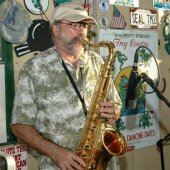
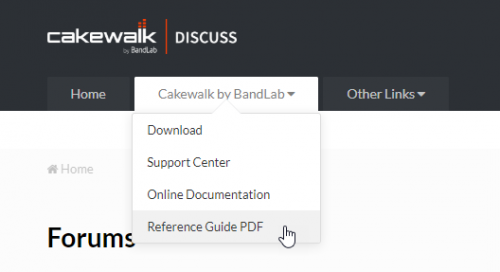
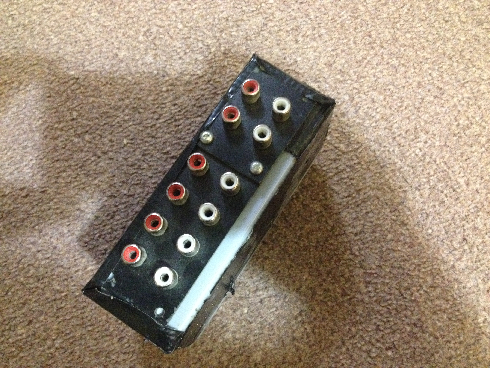
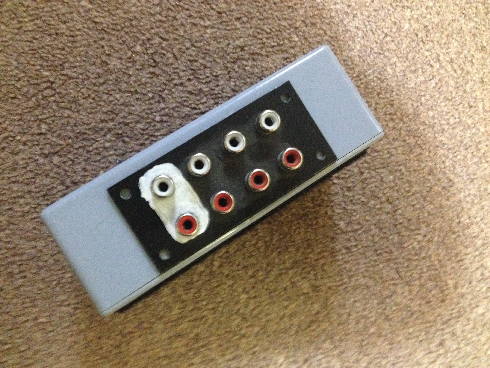
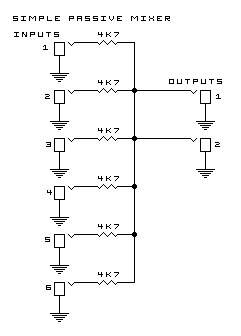

Stairway to..................
in The Coffee House
Posted
Escher you climb them up or down.
https://en.wikipedia.org/wiki/Relativity_(M._C._Escher)#/media/File:Escher's_Relativity.jpg